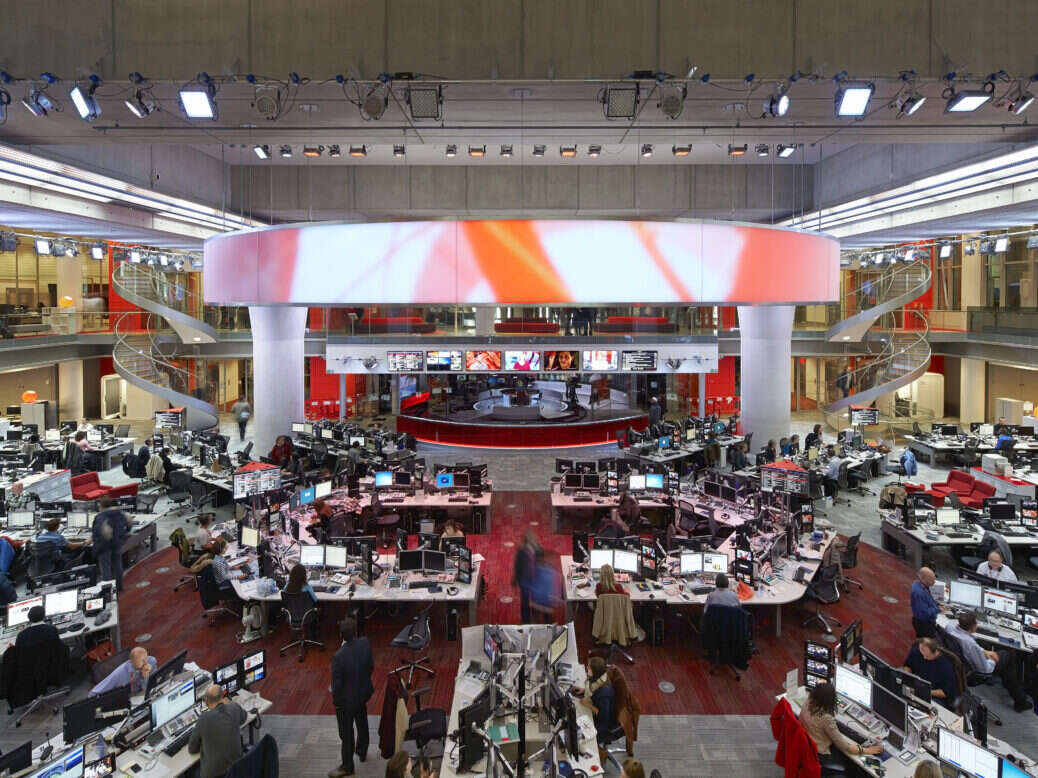
The merger of the BBC News and BBC World News channels will see the broadcaster’s biggest radio shows visualised on TV, starting with 5 Live’s Nicky Campbell.
The BBC revealed on Monday it will broadcast the new global channel, which is set to launch in April 2023, from London during UK daytime and Singapore and Washington DC during the rest of the day.
70 BBC job cuts in UK news division
When asked by Press Gazette, a BBC spokesperson confirmed 70 job cuts are expected from the BBC News operation in the UK.
They also confirmed 20 jobs are expected to be created on and off screen in Washington DC.
Why is the BBC merging News channels?
The broadcaster first announced plans to merge the UK-focused BBC News and internationally-focused BBC World News channels in May, in a major reform of its operations aimed at saving £500m over the next few years.
The plans also included axing the BBC Four and CBBC channels on TV and making them online-only.
Thursday’s announcement set out how the new channel will work in more detail: it will retain the ability to give UK viewers and international viewers different content at certain times of day and for major domestic news stories.
Global breaking news will be covered by a new live news team.
The BBC promised a number of new flagship news programmes built around high-profile journalists but has not yet given any more detail.
BBC to adopt some LBC and TalkTV formats
It did say there were plans to visualise programmes based on popular radio shows, similar to the style adopted by commercial radio rivals like LBC and Talkradio – first on Youtube and now, in the latter’s case, on TalkTV.
The BBC said this would begin with Nicky Campbell’s BBC Radio 5 Live programme, which will be broadcast on BBC Two on weekday mornings and on the new channel, but only in the UK, when it launches.
For sports, the UK-facing daily round-up Sportsday will still feature alongside multiple new global-facing programmes.
BBC News digital director Naja Nielsen said: “Our aim is to create the best live and breaking video news service in the world – on our web pages, our apps, on iPlayer and on our new TV news channel.
“The way audiences consume news is changing. In recent years we’ve seen a huge surge in audiences coming to our live coverage, with tens of millions following live pages when big stories and events unfold.
“As the world’s most trusted source of news, with a huge depth and breadth of expertise, the BBC is uniquely placed to offer audiences the best analysis and explanation as these stories are unfolding.
“So we are investing in new capability to cover breaking news stories, and our news channel and digital teams will work hand in hand to bring the best journalism to audiences both at home and abroad.”
Will the new BBC News channel still be free?
The merged channel will remain free-to-watch and ad-free for UK viewers with a TV licence, while those watching from abroad will see advertisements, similar to the current set up for BBC World News.
At times of groundbreaking news in the UK, a domestic-only stream of the programme will be available to ensure UK viewers can stay up to date on the latest domestic news developments.
The plans are now subject to a consultation with BBC staff and trade unions.
Picture: Hufton+Crow / View Pictures / Universal Images Group / Getty Images
Email pged@pressgazette.co.uk to point out mistakes, provide story tips or send in a letter for publication on our "Letters Page" blog
